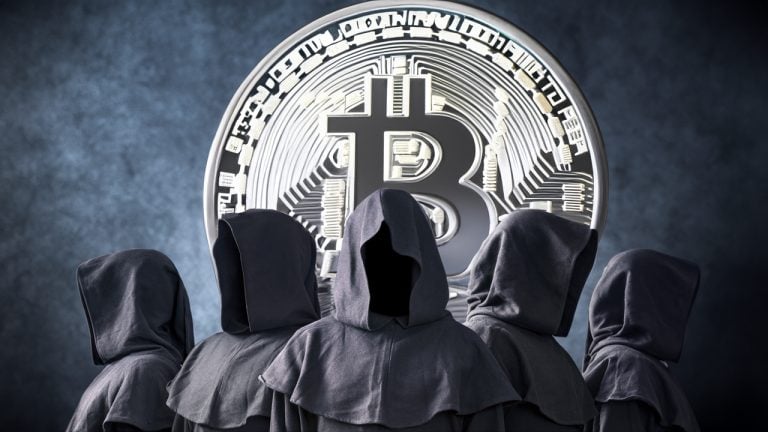Bitcoin Advocate Nic Carter Accuses ‘Laser-Eyed Maxis’ of Turning Bitcoin Into a ‘Secular Cult’
Publikováno: 9.6.2023
 In a tweet this week, crypto advocate Nic Carter took aim at those who claim to be bitcoin enthusiasts but have been applauding the U.S. Securities and Exchange Commission’s (SEC) enforcement actions. Carter accused these individuals of turning Bitcoin into a “secular cult” and argued that the “vast majority” of them are actually newcomers to […]
In a tweet this week, crypto advocate Nic Carter took aim at those who claim to be bitcoin enthusiasts but have been applauding the U.S. Securities and Exchange Commission’s (SEC) enforcement actions. Carter accused these individuals of turning Bitcoin into a “secular cult” and argued that the “vast majority” of them are actually newcomers to […]

In a tweet this week, crypto advocate Nic Carter took aim at those who claim to be bitcoin enthusiasts but have been applauding the U.S. Securities and Exchange Commission’s (SEC) enforcement actions. Carter accused these individuals of turning Bitcoin into a “secular cult” and argued that the “vast majority” of them are actually newcomers to the cryptocurrency space. His criticism highlights the growing divide within the Bitcoin community between those who prioritize decentralization and those who welcome regulatory oversight.
Nic Carter ‘Laser Eyes or Bitcoin Maximalism Isn’t Like a Religion, It’s Literally One — It Has Everything a Religion Has’
As of late, a number of Bitcoin advocates have been seemingly cheering on the U.S. Securities and Exchange Commission’s (SEC) enforcement actions against major exchanges like Binance and Coinbase. These individuals argue that all cryptocurrencies except for bitcoin (BTC) are unregistered securities and have been eagerly awaiting the SEC’s crackdown. However, longtime Bitcoin supporter Nic Carter took to Twitter to criticize this group, claiming that they have turned Bitcoin into a “secular cult.” In a lengthy tweet, Carter accused these so-called “bitcoiners” of blindly following a dogmatic belief system.
#Bitcoin maxis have saved MILLIONS.
Crypto has lost BILLIONS.
We are not the same. pic.twitter.com/r4KliZkYvY
— The ₿itcoin Therapist (@TheBTCTherapist) June 7, 2023
“[You can call this group] ‘laser eyes’ or ‘maxis,’ whatever you want, they know who they are, we know who they are,” Carter said. “There’s no uncertainty about this – they are people that elevated Bitcoin from a mere tool to a belief system, a way of life. The vast majority of these cult adherents are actually new to Bitcoin,” he added. According to Carter, this group of Bitcoin enthusiasts peddles false promises of wealth and endless price growth. He also noted how they have bought into “fallacies like the stock-to-flow model.”
Carter stressed:
Again, remember that these are latecomers. They needed to find a moral high ground over the established crypto elites, that mostly made money from their participation in the space, and the pure, underprivileged Bitcoin plebs.
Carter’s criticism of this group of Bitcoin enthusiasts didn’t sit well with everyone. One person accused him of being too focused on short-term gains, arguing that simply “stacking” Bitcoin would have yielded better returns all along. Another individual questioned Carter’s assertion that the majority of these enthusiasts are newcomers to the space. “I’m curious where you draw the conclusion that Bitcoin maximalists are new to the space,” the person asked. Carter’s response was blunt: “Because I have eyes.” While some agreed with Carter’s sentiment and expressed their own frustration with Bitcoin maximalists, others dismissed his comments as nothing more than a rant.
One of the most absurd threads I ever read. If Coinbase just focused on Bitcoin, it would be irrelevant as a company. The reason why Coinbase matters is that they embraced the innovation that happens across the industry.
And bitcoin maxis cheering excessive & arbitrary… https://t.co/67kIKEwjzB
— Brian Fabian Crain (@crainbf) June 7, 2023
Carter’s viewpoint was met with opposition from an individual who claimed to have been a “hardcore maxi” since 2016. This person shared their experience of stacking sats and withdrawing their bitcoin from exchanges. In a lengthy response, they vehemently disagreed with the notion of using centralized exchanges and entrusting them with one’s bitcoins. According to them, this practice is even worse than relying on banks to hold one’s money. He added:
Coinbase and Binance need to fail they hold way to much customer bitcoin. It needs to be withdrawn immediately from all these exchanges. My profile was created in 2011. I’m honestly surprised you haven’t blocked me yet because of laser eyes.
In his tweet, Carter didn’t hold back in his criticism of BTC maximalists, claiming that they aren’t interested in building real companies. Instead, he argued, they’re more like members of a religious cult, complete with their own set of religious texts, a conception myth, eschatology, rituals, and even a tithe. According to Carter, these cultists take issue with exchanges like Binance and Coinbase because they listed other cryptocurrencies, which they see as “impure.” This is despite the fact that these exchanges have “done more for bitcoin adoption and accessibility than literally any other companies in the industry’s history,” he said.
While Carter acknowledges that Binance and Coinbase may have made some questionable decisions, he also recognizes that they are two very different companies with different regulatory strategies. Despite this, he believes that “they did provide the tools for bitcoin to achieve global adoption in a way that wasn’t possible before.” Carter’s criticism of Bitcoin tribalism is nothing new, as the community has been grappling with issues and debates associated with altcoins and block size scaling for years.
More recently, there has been a growing chorus of voices arguing that non-fungible tokens (NFTs) and BRC20 tokens have no place on the Bitcoin network. This has sparked a fierce debate within the community, with some ‘laser-eyed maxis’ arguing that the Bitcoin blockchain should be used exclusively for financial transactions.
What do you think about Nic Carter’s opinion of laser-eyed maximalists? Share your thoughts and opinions about this subject in the comments section below.